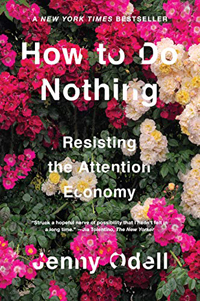
Although a glut of books on attention were vying for our own, hers stood out-not for the originality of its argument, I suspect, but for the sincerity of her persona on the page.


Her previous book, “ How to Do Nothing: Resisting the Attention Economy” (2019), became a surprise best-seller, raising an alarm about how social media had fractured our capacity for deep focus and corralled us into relentless self-optimization. Odell’s work has a knack for finding the right conditions and anchoring itself in them. It is the kind that waits for the right conditions, that holds always the ability to begin something new.” “Not the monolithic, empty substance imagined to wash over each of us alone, but the kind that starts and stops, bubbles up, collects in the cracks, and folds into mountains. “It has been a reminder of time,” she writes about her unlikely companion. For the next three years, she and the moss shared air and sunlight as she wrote at the kitchen table, the rhizoids that grabbed at the soil taking root in her imagination. The moss spores arrived in the spring that Odell began working on her book “ Saving Time” (Random House). Silently, it began making a home in the cool damp of Jenny Odell’s kitchen, in a pig-shaped planter. Publisher: Melville House Publishing ISBN: 9781612198552 Number of pages: 256 Weight: 266 g Dimensions: 209 x 140 mm You may also be interested in.The intruder entered not through the door but through the window. Provocative, timely, and utterly persuasive, this book is a four-course meal in the age of Soylent. Once we can start paying a new kind of attention, she writes, we can undertake bolder forms of political action, reimagine humankind’s role in the environment, and arrive at more meaningful understandings of happiness and progress.įar from the simple anti-technology screed, or the back-to-nature meditation we read so often, How to do Nothing is an action plan for thinking outside of capitalist narratives of efficiency and techno-determinism. Odell sees our attention as the most precious-and overdrawn-resource we have. So argues artist and critic Jenny Odell in this field guide to doing nothing (at least as capitalism defines it). doing nothing may be our most important form of resistance.

But in a world where our value is determined by our 24/7 data productivity. Nothing is harder to do these days than nothing.


 0 kommentar(er)
0 kommentar(er)
